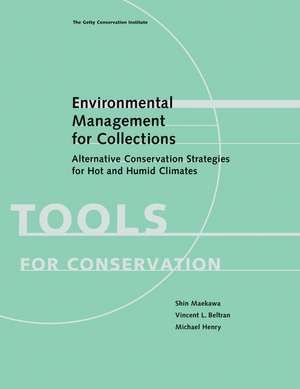Environmental Management for Collections: Alternative Conservation Strategies for Hot and Humid Climates: Tools for Conservation
Autor Shin Maekawa, Vincent L Beltran, Michael C. Henryen Limba Engleză Paperback – 20 apr 2015
In recent years more cultural institutions in hot and humid climates have been installing air-conditioning systems to protect their collections and provide comfort for both employees and visitors. This practice, however, can pose complications, including problems of installation and maintenance as well as structural damage to buildings, while failing to provide collections with a viable conservation environment.
This volume offers hands-on guidance to the specific challenges involved in conserving cultural heritage in hot and humid climates. Initial chapters present scientific and geographic overviews of these climates, outline risk-based classifications for environmental control, and discuss related issues of human health and comfort. The authors then describe climate management strategies that offer effective and reliable alternatives to conventional air-conditioning systems and that require minimal intervention to the historic fabric of buildings that house collections. The book concludes with seven case studies of successful climate improvement projects undertaken by the Getty Conservation Institute in collaboration with cultural institutions around the world. Appendixes include a unit conversion table, a glossary, and a full bibliography.
This book is an essential tool for cultural heritage conservators and museum curators, as well as other professionals involved in the design, construction, and maintenance of museums and other buildings housing cultural heritage collections in hot and humid climates.
This volume offers hands-on guidance to the specific challenges involved in conserving cultural heritage in hot and humid climates. Initial chapters present scientific and geographic overviews of these climates, outline risk-based classifications for environmental control, and discuss related issues of human health and comfort. The authors then describe climate management strategies that offer effective and reliable alternatives to conventional air-conditioning systems and that require minimal intervention to the historic fabric of buildings that house collections. The book concludes with seven case studies of successful climate improvement projects undertaken by the Getty Conservation Institute in collaboration with cultural institutions around the world. Appendixes include a unit conversion table, a glossary, and a full bibliography.
This book is an essential tool for cultural heritage conservators and museum curators, as well as other professionals involved in the design, construction, and maintenance of museums and other buildings housing cultural heritage collections in hot and humid climates.
Preț: 384.93 lei
Preț vechi: 437.92 lei
-12% Nou
Puncte Express: 577
Preț estimativ în valută:
73.66€ • 76.75$ • 60.99£
73.66€ • 76.75$ • 60.99£
Carte indisponibilă temporar
Doresc să fiu notificat când acest titlu va fi disponibil:
Se trimite...
Preluare comenzi: 021 569.72.76
Specificații
ISBN-13: 9781606064344
ISBN-10: 1606064347
Pagini: 344
Ilustrații: 247 color and 33 b-w illustrations
Dimensiuni: 216 x 279 x 30 mm
Greutate: 1.72 kg
Ediția:1
Editura: Getty Publications
Colecția Getty Conservation Institute
Seria Tools for Conservation
ISBN-10: 1606064347
Pagini: 344
Ilustrații: 247 color and 33 b-w illustrations
Dimensiuni: 216 x 279 x 30 mm
Greutate: 1.72 kg
Ediția:1
Editura: Getty Publications
Colecția Getty Conservation Institute
Seria Tools for Conservation
Recenzii
“It is absolutely right that conservation be in step with the socio-political context surrounding environmentally sound approaches. This text does that, and does it well. The authors have, admirably, been awarded the 2016 Prose Award for Environmental Science, and they are to be congratulated for producing a text that is seen as having an impact outside of the conservation sphere. The technical theory that underpins the text is accessible, and the solutions borne out through the case studies do present as being admirably pragmatic.” —Journal of the Institute of Conservation
“The authors have done an excellent job of breaking down the technical topics into a manageable and logical presentation that effectively illustrates these topics and makes them understandable for the varied audience.”
Notă biografică
Shin Maekawa is a senior scientist at the Getty Conservation Institute. Vincent L. Beltran is an assistant scientist at the Getty Conservation Institute. Michael C. Henry is a principle at Watson and Henry Associates, in Bridgeton, New Jersey.
